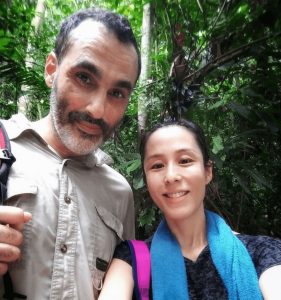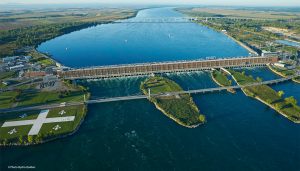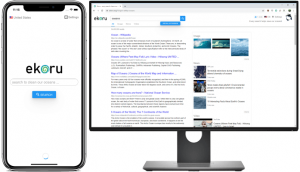Canada is home to a new kind of search engine that turns every web search into an action in support of a cleaner, greener environment.
What’s more, not only does the company behind this search engine use clean electricity to power its technical infrastructure, it also cleans the search data that users generate as an action in support of personal privacy and data security.
The physical infrastructure behind Ekoru.org is in Canada – the water-cooled servers that deliver search results; the air-cooled data centre that houses them; the clean, green power grid that keeps the lights on and the whole operation running smoothly, using what’s known as run-of-the-river hydroelectricity.

The team behind Ekoru.org takes the concept of remote work from home to a new level: Ati and Alison Bakush live in Kuala Lumpur. The company data centre is in Canada.
But in these days of pandemic shutdown and the work-from-home realities it has brought, the founding team behind the Ekoru.org search engine takes the definition of remote work a bit further than most: they are based in Kuala Lumpur, Malaysia!
Building on his technical savvy and IT work experience, a few digital tools and online communication platforms, as well as the partnership and support (not to mention marketing communications expertise) of his Malaysian wife, Alison, Ati Bakush started a company that would both satisfy their collective skillsets and their real desire to make a difference in the world.
The couple has four children, for whom a different world with different priorities could be very beneficial.
Bakush is an Australian with two decades of experience in software development for mobile operators and ISPs throughout southeast Asia. He’s spent years building transaction engines, messaging and search platforms, analytics and location dashboard tools and more, always with an eye towards the protection of personally-identifying information…and the planet.
His technical know-how, coupled with a long-simmering concern about the environment and a dedication to ocean conservation, in particular, came together in Ekoru.
Personal Data, Global Concerns
Search engines are supposed to help the user find out about some topic of interest or relevance, but we know that by using a search engine, users also reveal a lot of information about themselves (regardless of whether they know it or not, often whether they have consented or not). That information can be very valuable to search engine operators, social platforms and service providers, data aggregators, and online advertisers, so it is often collected, analyzed, and shared widely among third-party commercial entities (if not other players in the digital ecosystem).
As one way to limit the threat to personal data that resides in most search tools, all of the data that travels between a user’s browser and the Ekoru.org servers is encrypted to deter unwanted access. Data gets cleaned it up before it is used and it’s cleaned up afterward: Once a search is complete, Bakush says, zero data is retained on company servers.
So while Ekoru is a search engine that respects your privacy, it also respects the planet and gives you a chance to show you do, too. Every time you search, an environmentally-protective organization or enterprise gets some financial support. Unfortunately, it has often been the other way around: our searches used to be conducted in technical environments that were not so environmentally friendly: while the energy consumption levels of some large data centres are getting better, there is much more that can be done, as Ekoru sees it.

Big Blue Ocean Cleanup, one of the world’s leading ocean cleanup non-profits, gets support through the Ekoru search engine.

With support from Ekoru, divers from Operation Posidonia, a program led by the University of New South Wales, replant seagrass on the ocean floor.
It is a partner with many eco-sensitive organizations around the world, such as Big Blue Ocean Cleanup in the UK, which helps organize volunteer teams to remove plastic waste from the oceans, and Operation Posidonia, a program led by the University of New South Wales, which combats climate change by replanting ocean seagrass, a very productive and eco-effective plant.
Ekoru shares some 60 percent of its revenue with its ocean conservation partners; revenue is generated by sponsored search results and triggered when a user clicks on such results.
Only in Canada, Eh!?!
What’s more, Ekoru’s eco-friendly vision and commitment are among the reasons the company has its physical presence in this country.
In a series of e-mail exchanges with WhatsYourTech.ca, Ati Bakush explained that “Our number one priority for the location of our servers was to have as close to a zero-carbon footprint as possible without sacrificing speed our uptime. Canada has an abundance of hydro-power and we were specifically able to identify a data centre in Beauharnois, Quebec, that met our criteria.”
The company wanted to use clean, renewable energy from hydro generation; in particular, it wanted that run-of-the-river hydro because it has a minimal environmental impact (less than that of power generated by water from man-made diversion or dams).
Ekoru also wanted to operate a data centre that could be run without air conditioning, but with natural airflow cooling.

Canada has an abundance of hydropower, making the location of the Ekoru data centre near Beauharnois, Quebec an easy and eco-friendly decision.
Only in Canada could Bakush meet his preconditions.
“We felt it was essential to operate in good faith and ensure that each transaction/interaction with our users had the lowest environmental footprint possible. While we cannot guarantee that the user or the Internet provider on the other end of the connection is relying on renewable energy, we can do our part and ensure that we are. The modern environmental movement is about everyone else doing their part, voting with their wallets, and making demands of the businesses they acquire goods and services from.”
As important as being green was to Bakush, he knew his company had to be fast, too.
It had to be able to deliver top quality services, so the next step was to determine that the company could provide the expected quality from Canada. Speed and latency tests were conducted out of Beauharnois to various points around the world (using typical US speeds as a baseline).
Perhaps surprising to some, Bakush found that equivalent or just marginally slower speeds were available to all global regions.
“Canadian consumers might feel that their connections are relatively slow, but our concern for users worldwide wasn’t the Canadian ‘last mile’, Bakush noted. “We were more interested in the international transit speeds internationally from a Canadian data centre to the rest of the world. Fortunately, Canadian international data links are excellent, and locating services there, based on our tests, was as good as locating them in the USA.”
Canadians might also feel their privacy regime is weak or not comparable to other jurisdictions worldwide, and they may have a point. But again, Bakush and Ekoru did their homework and they are comfortable with the state of the IT landscape here.
“I would say that Canada possibly has a better reputation outside of Canada than within, on the issues of data protection and rights,” Bakush added. “Anecdotally, we have received positive feedback on having our servers in a Canadian jurisdiction. We do see traffic from a number of regions with a strong surveillance regimen including China, Iran, Saudi Arabia, and the UAE. This could be users showing support for our ocean conservation cause, or taking advantage of our privacy policy, or both.
“[I]it doesn’t hurt that Canada is politically and legislatively stable. We obviously don’t expect instability … which might force us to reconsider relocating elsewhere.”

Ekoru supports multiple web browsers, with downloadable extensions and apps for various platforms and browsers.
Ekoru supports multiple web browsers, with downloadable extensions available for Chrome, Firefox, Edge as well as apps for iOS and Android. It is also available as integrated search options in products like the Pale Moon desktop, and the Monument, OH, and Smart Cookie Android browsers.
Canada Tops in Infrastructure, Close in Users, Too
Asked about the uptake of Ekoru and its overall user base, Bakush cites some limitations in company analytics, due to its privacy policy and the fact individual users are not identified in the system.
But based on aggregate numbers, he does say as an approximation that the company currently has under one million users visiting per month (but growing fast, he adds); most users (about 28 percent) come from the US; Canada and Germany often swap second-place positions, each with about 22 percent of Ekoru users.
That’s fine; we’ve got the servers and the data centre here!
# # #

Plastic pollution in our oceans has been identified as a major economic and environmental concern. Countries like Canada and companies like Ekoru are among those around the world that want to take on the problem with creative technical and attitudinal solutions. All images courtesy Ekoru.org.
-30-



